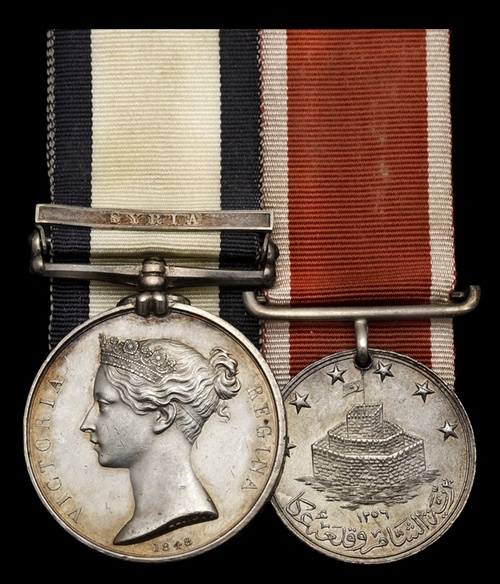
Auction: 24003 - Orders, Decorations and Medals
Lot: 82
The campaign pair awarded to Master W. W. White, Royal Navy, who served aboard the Paddle Sloop H.M.S. Gorgon during the operations off the coast of Syria; it was possibly a shell from that vessel which caused the great explosion of the Egyptian powder magazine during the Bombardment of Acre
Naval General Service 1793-1840, 1 clasp, Syria (Wm. W. White. Master, R.N.); St. Jean d'Acre, silver, unnamed as issued, mounted on silver straight-bar suspension for wear, mounted together court-style for display, light contact marks to first, very fine
Provenance:
Christie's, 1983.
Glendining's, 1984.
William Woodland White was born circa 1807 and followed in his mariner father's footsteps to have a career in the Navy. He entered first the merchant navy at an unknown date, in which he served for four years. White was married to Mary Ann Newing Skinner at St. Peter in Liverpool on 7 March 1829, his profession listed as 'mariner'. White's first appointment with the Royal Navy appears on 24 August 1830 as a 2nd Master aboard the steam tug H.M.S. Confiance. It is unknown whether he attained this rank due to his time in the merchant navy, or because he had entered the Royal Navy prior to this date.
The Confiance travelled extensively between England and the Mediterranean, taking White to Lisbon, Gibraltar, Malta, Corfu, Cadiz and Porto, among others. Confiance was also allegedly involved in the rescue of a French transport ship for which her Captain, Lieutenant Henry Belson, received a French Life Saving Medal. White spent four years with her before joining the paddle gunboat H.M.S. Firefly on 27 March 1834 as Acting Master. Within a few weeks of his appointment, Firefly detained Portuguese slave schooner Despique off the coast of Cuba carrying over two hundred slaves. Despique was condemned and Firefly arranged to have the freed slaves set ashore at Nassau where they joined 'Adelaide', a community of would-be slaves taken to the Bahamas by British anti-slavery ships.
Firefly returned to England on 4 February 1835 and burst its boiler shortly afterwards and was unable to depart for the Mediterranean. White was paid off on 22 January 1836 and then joined brigantine mail carrier H.M.S. Seagull that May. He remained with her for less than a year before being advanced Master on brig H.M.S. Swift in May 1837. This proved once again to be a limited appointment with White joining the newly built H.M.S. Gorgon on 20 June 1839, retaining the rank of Master.
Gorgon was the largest steam vessel in the service of the Royal Navy, with accommodation for one thousand troops on board. She is known for her prominent position in the Syrian campaign, during which she transferred troops to the region and was involved in repeated bombardments of Beyrouth. The most notable engagement of the conflict was when she participated in the bombardment of Acre alongside paddle sloops Vesuvius, Stromboli, and Phoenix, all under the command of Admiral Robert Stopford. It was either Gorgon or her sister ship H.M.S. Benbow that fired the consequential shell which destroyed Acre's powder magazine and greatly weakened the city's defences - significantly aiding a British victory. Admiral Stopford commented, 'The steam vessels have been eminently useful in constantly moving along a great extent of coast with troops and arms, and taking part in the attacks upon the different forts, which services have been executed entirely to my satisfaction.'
After the close of the conflict, Gorgon returned to England with White being paid off at Woolwich on 2 April 1842. At some stage before this White had been widowed, as after his return from Syria he remarried Elizabeth Anne Baker on 4 May at St. George's Church in Camberwell, Surrey. He did not return to sea with the Royal Navy again until 5 September 1846 with an appointment as Master to the H.M.S. Gladiator, who was part of the specially formed 'Squadron of Evolution' that undertook sea trials off the coast of Ireland.
Gladiator was part of this squadron in May 1847 at the surrender of Junta in Portugal. She was later in the Mediterranean and White served with her until quitting both her and the Royal Navy in March 1849. The birth of his daughter Rose Ann Sarah White occurred at Gillingham in 1850, and in 1855 White was removed to the reserve list and reduced to half-pay. He and his family lived in Folkstone before moving to Gravesend where White died on 19 June 1863.
Sold together with a bound booklet of comprehensive copied research.
Subject to 20% VAT on Buyer’s Premium. For more information please view Terms and Conditions for Buyers.
Sold for
£1,400
Starting price
£1400




